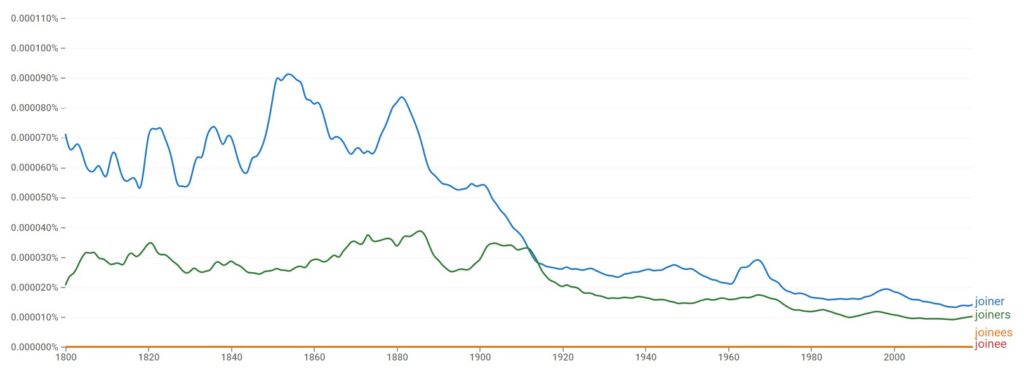The words “joiner” and “joinee” refer to new employees at a company. However, are both of these words correct, or is one of them not as good to use as the other? This article will dive into that question and share the statistics of each to shed some light on the situation.
“Joiners” Or “Joinees”: Which Is Correct?
“Joiners” means to talk about a new employee starting at a company. It’s correct to use in English and is the only spelling of the two that is recognized. “Joinees” is incorrect, though you might come across it in countries like India.

As we’ve mentioned, “joinees” is incorrect to use. No native English speakers will recognize it, so it’s best to avoid using it.
However, it seems apparent that Indian English speakers use the word “joinees,” and it might be related to the fact we call people “employees,” but we’ll get to that in a little while.
The definition of “joiner,” according to The Cambridge Dictionary, is “someone who agrees to take part in an arrangement or become a member of an organization.”
We can also use the data from the following graph to see that we use “joiner” and “joiners” (plural form). However, they’ve both fallen in popularity over recent years. “Joinee” and “joinees” (plural form) are never used.

What Is The Meaning Of “Joiners”?
So, what is a “joiner,” then? We can talk you through two meanings, but we’ll focus on the key definition first and include some examples of how it works.
A joiner is a new employee who is starting work at a company.
- The joiners are set to sign up in about three weeks.
- We’ve got new joiners with us today, so make them feel welcomed.
- These are all the joiners that we’ve shortlisted.
- I’m a joiner at my company, and they’re looking to expand the workforce further.
- We’re all joiners because it’s a brand-new start-up company.
- Have you got any space for another joiner?
- Please welcome the new joiners!
As you can see, a “joiner” is somebody who has recently joined a company or organization. It’s similar to saying something like “new employee” or “new hire,” but it only needs one word rather than two.
It’s not common to use in English. In both UK and US English, it’s more common to use an alternative, which we’ll cover later. Still, if you want to talk about a new hire at a company, “joiner” is always a good option to do so.
What Does “Joiner” Mean In England?
The second meaning of “joiner” is most commonly found in UK English. There are chances to come across it in US English, but it seems to apply mostly to the people in England.
A “joiner” in England is someone who works with wood. If their profession is related to woodworking, they’re called a joiner because they join wooden structures together to create a larger product.
The definition of “joiner” in this regard, according to The Cambridge Dictionary, is “a skilled worker who makes the wooden structures inside buildings, such as doors and window frames.”
As we said, it’s not only England that you’ll find this meaning applies. It’s common for people in America to use “joiner,” though they’d much rather call them woodworkers since “joiner” is a more slang term.
What Is The Meaning Of “Joinees”?
“Joinees” isn’t a word. It’s never used in English, and the only time you’ll come across it is if you’re speaking to a non-native speaker who might be confusing the term with something else.
For that reason, we don’t think it’s appropriate to give you any examples. “Joinees” is always wrong, and you should use “joiners” when you want to convey the same meaning.
“Joinees” means the same as “joiners” but is incorrect. If you want to use it, make sure you spell it as “joiners” to be grammatically correct.
Why Do People Use “Joinees”?
It might help you to understand why it’s such a confusing word for non-native speakers if you understand why it’s come about. We often attribute incorrect words like this to something else in English that might be related, and we can do the same here.
“Joinees” is similar to “employees,” using the “EE” ending. “New employees” is the meaning given for “joiners,” so it’s common for people to misspell it and end up with “joinees,” which combines the two words.
Of course, there are no situations where this is correct to use. You should avoid doing so if you want to impress native speakers with your grasp of the language.
What Does “Immediate Joiner” And “Immediate Joinees” Mean?
There are a few phrases and words you might accompany “Joiner” with. You might also hear it with “joinees,” but again, this isn’t a common spelling.
“Immediate joiner” means that someone is going to start at a new company right away. It means they’re expected to join in the present without having to wait a long time for any paperwork or documents to go through.
Usually, joiners have to wait a certain amount of time before they can start work. Whether it’s related to paperwork or job availability, you’ll have to wait a few weeks before you can start.
An “immediate joiner” is given a break from this waiting and can join the company right away. Usually, you’ll be able to waive the paperwork or postpone the necessary pieces of information collection until later.
“Immediate joiners” are usually for companies that are desperate for employees. If they’re short-staffed and need a hand, they’ll look for immediate joiners.
Other Words For Someone Who Joined Your Company Recently
As we’ve mentioned previously, “joiners” isn’t the most common word to use. There are plenty of good alternatives to use to talk about someone who joined your company recently.
- New employee
- New hire
- New recruit
- Latest member
- Rookie
- Novice
- Fledgling
- Newbie
- Newcomer
- Freshman
- Starter
All of these words refer to somebody who is new to a company. You can use all of these to talk about them in some way. The first four are the most appropriate for formal settings, while all the others are general better to use informally.

Martin holds a Master’s degree in Finance and International Business. He has six years of experience in professional communication with clients, executives, and colleagues. Furthermore, he has teaching experience from Aarhus University. Martin has been featured as an expert in communication and teaching on Forbes and Shopify. Read more about Martin here.
